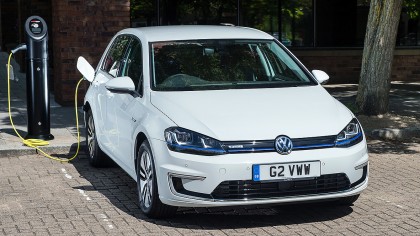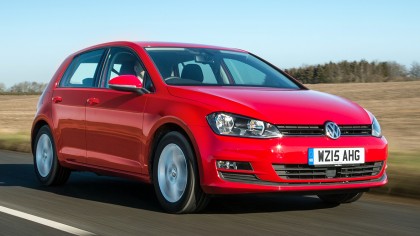Can a plug-in car really save you thousands every year?
Emission impossible
VW eGolf

vs VW Golf 1.0 TSI Bluemotion

Let's start by mixing some metaphors and punting the elephant in the room into the the long grass. If there's one Volkswagen that doesn't have faked emissions, it's surely the eGolf. After all, as a pure electric car with batteries, an electric motor and no combustion engine, it doesn't have any emissions at all.
Obviously, there's a debate to be had regards the emissions associated with charging any EV. But that's a discussion for another day. In the here and now, the big question is whether an eGolf is a viable alternative to a standard Golf in financial terms. Could it even be a money saver? Let's find out.
First things first, list prices. The eGolf rocks in at a hefty £26,325 including the £5,000 government grant for plug-in electric cars. That's about £1,000 cheaper than the current Golf GTI. But that's a 220hp rocket that'll hit 62mph in 6.5 seconds. The eGolf has just 115hp and sails silently to 62mph in a rather leisurely 10.4 seconds. And the GTI isn't really about efficiency, anyway.
But what about the intriguing new 1.0 TSI Bluemotion model. It's petrol, so it sidesteps all those local emission diesel down sides. It also sports exactly the same 115hp as the eGolf. Bingo.
The 1.0 TSI is so new, VW hasn't worked out its finance options yet. But based on other Golfs, the numbers will likely be as follows. Based on a deposit of about £2,000, a dealer contribution of £1,250 and a deal duration of 36 months, you're looking at monthly payments of about £600 for the eGolf and £290 for the 1.0 TSI. Both cars are in VED band A, so that means no road tax is payable.
At this stage, it's looking pretty bad for the eGolf, but what happens when you actually fuel these things? The 1.0 TSI is rated at 65mpg on the combined cycle. Let's call that 55mpg all-round average in the real world. Then let's do the sums based on 10,000 miles annually.
In that scenario, you're looking at about £80 a month in petrol versus roughly £20 a month in charging costs. So that's net £60 in the eGolf's favour. But not enough to offset the eGolf's monthly payments. The problem is the it's simply a more expensive car.
Get daily insight, inspiration and deals in your inbox
Sign up for breaking news, reviews, opinion, top tech deals, and more.
One could, of course, compare the eGolf to something like a Golf GTD and the gap would be narrowed. Up the monthly mileage and it only gets better for the eGolf, though doing more than 10,000 miles a year in a car with a real-world range of about 100 miles isn't going to be a typical usage model, let's be honest.
This step up the food chain hasn't worked out too well for the EV. No doubt there are scenarios where the eGolf will work out cheaper. But for most people, most of the time, an eGolf is something you'll probably have to pay extra for.
Technology and cars. Increasingly the twain shall meet. Which is handy, because Jeremy (Twitter) is addicted to both. Long-time tech journalist, former editor of iCar magazine and incumbent car guru for T3 magazine, Jeremy reckons in-car technology is about to go thermonuclear. No, not exploding cars. That would be silly. And dangerous. But rather an explosive period of unprecedented innovation. Enjoy the ride.